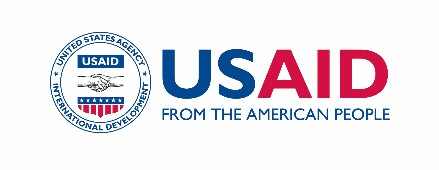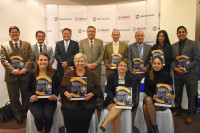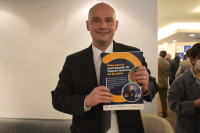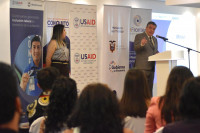Economic Inclusion Project Launches Guide to Promote Employability of Migrants and Refugees in Ecuador
WOCCU and USAID engage local partners to promote new tool
September 19, 2022
QUITO, Ecuador—With the goal of facilitating effective and inclusive employment solutions for migrants, refugees and local residents, the United States Agency for International Development (USAID), World Council of Credit Unions’ (WOCCU) Economic Inclusion Project (EIP), the Ecuadorian Ministry of Labor, CONQUITO and Program Sin Fronteras have joined efforts to develop “The Guide for the Hiring of Human Talent in Ecuador.”
Through this new tool, EIP aims to help employers identify and navigate the current regulations and services impacting the labor market, so they can improve their hiring success. The Guide is also designed to help employers integrate training sessions into their hiring processes to maximize employee potential and reduce the investment of resources dedicated to recruitment, which should make it easier to facilitate the hiring of migrants, refugees and locals.
The need for such a tool in Ecuador is great. A study from the Ecuadorian National Institute of Statistics and Census (INEC) states that only three out of 10 workers have formal jobs, with that ratio dropping to just one in 10 for migrants and refugees, according to the Protection Monitor created by ACNUR.
The Guide has four key components:
- A focus on the Ecuadorian labor market and migration;
- A policy framework for the hiring of migrants and refugees;
- A listing of services available to help with the strengthening of employment processes; and
- Identifying available job search platforms.
The Economic Inclusion Project held a September 14 launch event with more than 30 enterprises from the private sector.
To open the event, Jaime Chang, USAID Peru Project Management Specialist, called on the companies to integrate migrants and refugees into their workforces, so they can contribute to the local and national economy. Chang emphasized that migrants come to Peru and Ecuador with undeniable job skills.
Luis Capace, a Venezuelan migrant who participated in employment training through the UIO Integra program carried out by USAID, WOCCU and CONQUITO, spoke about his new job as a financial administrative coordinator in the “Comercio Activo Digital” project.
“The challenges to get a job are many, but the training for employability helped me to open doors for more opportunities, especially regarding the position that now I carry out, where, since the first moment, I have dedicated my entire effort,” said Capace.
Leticia Criollo, who was also benefited from the employability training, thanked the institutions that created the guide.
“(Their work) makes it possible for numbers to turn into life stories,” said Criollo.
Patricio Donoso, Ecuador's Minister of Labor, acknowledged the collaboration between USAID, WOCCU EIP, CONQUITO and Program Sin Fronteras to develop the Guide, and highlighted the access of equal opportunities for both Ecuadorians and Venezuelans.
“From the government of President Guillermo Lasso, we’re looking for more opportunities for those who haven’t had them, and The Guide for the Hiring of Human Talent is huge news—news that has to fill us with emotion, gratitude and warmth,” said Donoso
USAID and WOCCU are determined to continue creating alliances to generate more employment opportunities through the Economic Inclusion Project, which has assisted more than 5,000 Venezuelans and local residents with employment training and placement in Peru and Ecuador to date.
|
|
|
World Council of Credit Unions (WOCCU) is the apex association for credit unions and other global financial cooperatives. World Council promotes the sustainable development of credit unions and other financial cooperatives around the world to empower people through access to high quality and affordable financial services. World Council advocates on behalf of the global credit union system before international organizations and works with national governments to improve legislation and regulation. Its technical assistance programs introduce new tools and technologies to strengthen credit unions' financial performance and increase their outreach.
World Council has implemented 300+ technical assistance programs in 90 countries. Worldwide, 74,634 credit unions in 104 countries serve 411 million people. Learn more about World Council's impact around the world at www.woccu.org.




